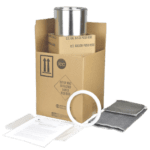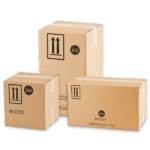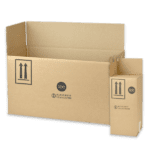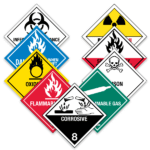
Hopefully last month you read our blog on the importance of checking state and operator variations in IATA. Spoiler alert, yes state and operator variations are definitely worth the read in IATA. Not only are they worth reading, but they are also required.
One of the more popular operator variations I come across with customers looking for UN Packaging is FX-02. FX-02 is an operator variation for those shipping class 6.1 dangerous goods in Packing Group I or II using Fed EX by air within the United States. It requires the use of Special Permit Packaging.
What is FX-02?
If you are using Fed Ex as your carrier and are shipping by air, make sure you check the operator variations located in Section 2.8 of IATA. There you will find the FX operator variations. Under FX-02, it says except for UN 1230, Methanol and Excepted Quantities (EQ), substances with a primary or subsidiary hazard of Division 6.1 in Packing Group I or II, with an origin and destination within the USA, including Puerto Rico, will only be accepted if in approved DOT Special Permit (SP) packaging; or will only be accepted for international transport in UN Specification Packaging that meets Packing Group I performance standards. Note: Subsidiary hazards of Division 6.1 without a Packing Group are not subject to FX-02a. What does this mean? This means if your dangerous goods are either a PG I or II, have either a 6.1 Primary or Subsidiary hazard, and you are shipping within the United States, you have to use a packaging that has a Special Permit attached to it. So, in a case like this, just using a regular UN 4G or 4GV packaging would not be compliant under the above conditions.
What is Special Permit Packaging?
A Special Permit is essentially PHMSA allowing a dangerous goods shipper to be relieved from certain parts of the regulations. A Special Permit packaging comes with a letter that tells you what regulations specifically the user is exempt from when using it to ship dangerous goods. For example, here at ICC, we offer Special Permit Kits.
When purchasing these kits, you would be sent the actual letter of exemption that would explain that users are exempt from having to place hazard labels on the outside of the box among other regulations, as long as the hazard class and packing group of dangerous goods being shipped is listed in the letter.
These Special Permit Kits fulfill IATA’s FX-02 variation requirement when shipping dangerous goods inside of the United States, including Puerto Rico. Of course, this packaging is a tested 4GV packaging, so you can use it even if you aren’t shipping by air or using Fed EX and still reap the benefits of not having to use hazard class labels under the conditions of the Special Permit. Although the Special Permit is only good within the United States, if you are in Canada, you can use these kits as standard 4GV packaging by just placing the Hazard Class Labels over the Special Permit number printed on the box. For more information on these kits, please contact us at 888-442-9628 (U.S.) or 888-977-4834 (Canada).
Reference:
IATA Dangerous Goods Regulations ADDENDUM. https://www.costha.com/uploads/1576783509_DGR61-Addendum1-EN.pdf
Note: FX-02, FX-03, FX-04, FX-05, FX-06, FX-09, FX-10 and …. https://www.fedex.com/content/dam/fedex/us-united-states/services/DG_IATA_Variations_2020.pdf
Stay up to date and sign up for our newsletter!
We have all the products, services and training you need to ensure your staff is properly trained and informed.
 US Special Permit Kits |
 4GV UN Boxes – Variation |
 4G UN Boxes – Combination |
 Hazard Class Labels |





